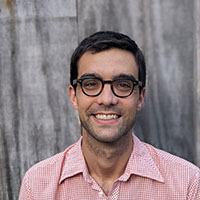
Lukas Moe
Visiting Lecturer in the Writing Program
Modern poetry, poetics, and the avant-garde; radical cultures and social movements; literary institutions; the literary history of labor and class
My research focuses on the formal imagination and cultural work of poetry in the twentieth-century United States. I'm interested in how poems circulate in contexts of social struggle, class identity, and racial formation. This historical dimension of my research overlaps with my curiosity about literature's capacity to fire our passions, to sustain our commitments, and to inspire us to feel and think beyond our habitual ways of being and talking about ourselves, our communities, and institutions.
In my book in progress, I argue that modernist concepts of autonomy and medium helped to shape the radical cultural politics and multiethnic pluralism of postwar American poetry.
I teach a first-year writing course on "the gift," which covers a range of topics from creativity and debt to philanthropy and effective altruism, and another on "building a better world," which explores the utopian ideals and practical strategies of human rights, feminism, socialism, decarbonization, among other worldmaking projects. I see writing as a practice, one that we improve as we do more of it. But it can feel daunting and frustrating, too. In my class we'll look to a variety of models and writing styles, not expecting ourselves to be perfect and celebrating the improvements we make. I encourage my students to undertake independent research, find topics that matter to them, and to write in genres and styles that feel energizing and urgent.
Besides my scholarly interests, I enjoy writing for public audiences in venues including the Los Angeles Review of Books, Social Text, and Chicago Review.
Current and upcoming courses
Building a Better World
WRIT179
What makes a world? And what makes a world beautiful, sustainable, inclusive, or just? At a time when humanity faces myriad global challenges, we can seek insight in writing that reimagines the world and helps us change it for the better. Reading the work of activists, philosophers, fiction writers, and political theorists, we will examine how past worlds shape those of the present and future. In particular, we will investigate the dynamics of inclusion and exclusion in these different visions of the world, asking questions such as: Who enjoys freedom, and when? What is a “human right,” and should those rights be the basis of social organization? In what ways has the nation-state been a force for emancipation, and in what ways a vehicle of empire? What would it look like to live in a world that was fully feminist in its design, or that was built on reparations for past injustices, or that prioritizes the health of the planet above all? What are the conditions necessary for individuals and societies to undergo transformation, improve, and thrive?